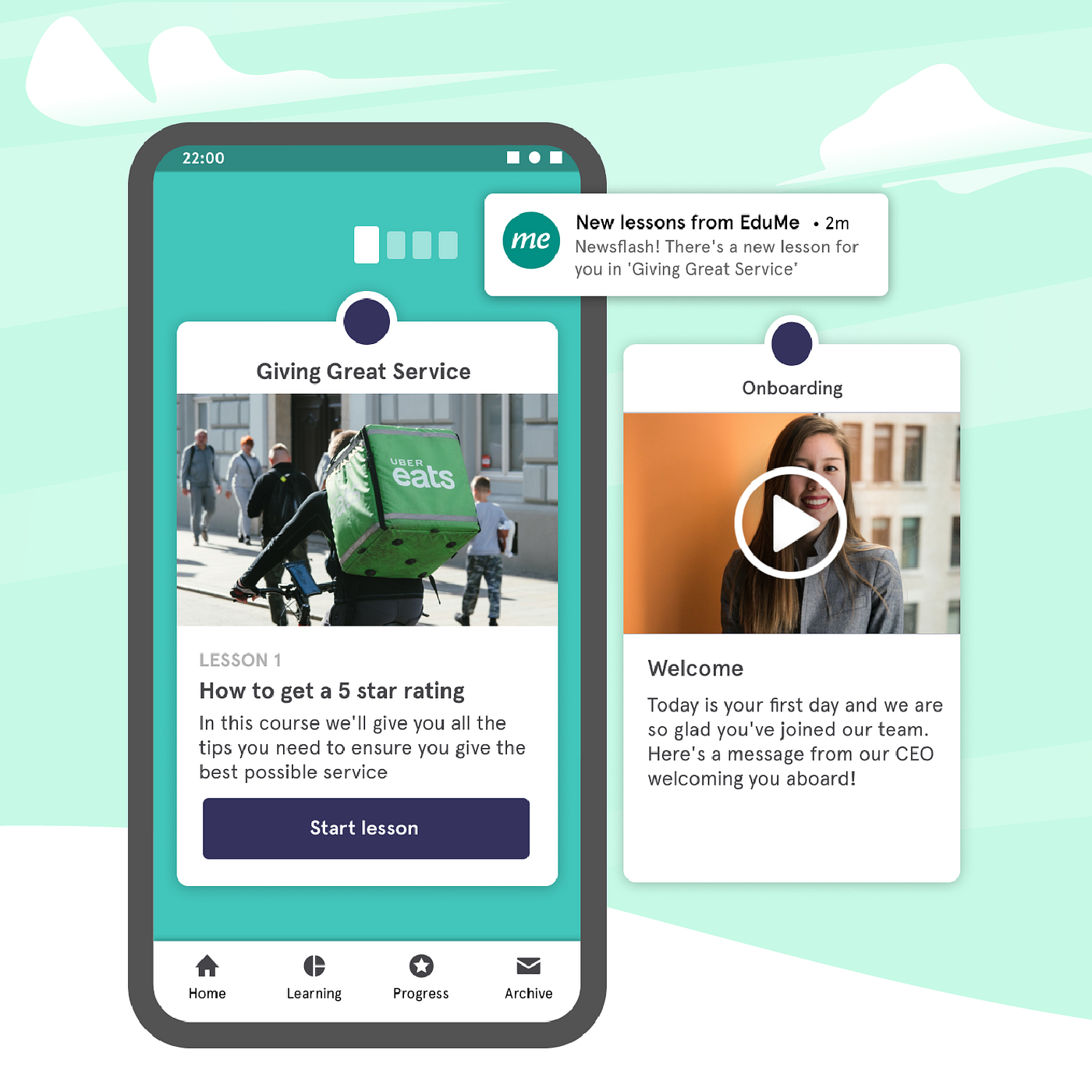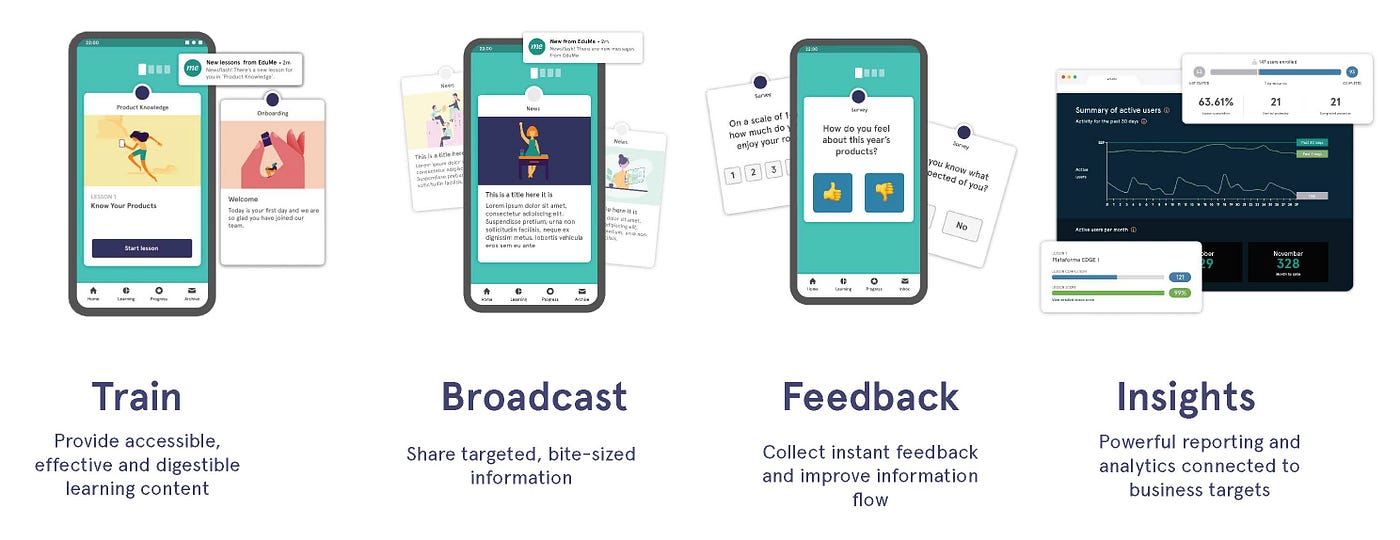By the middle of this decade, three-quarters of employees will be Millennials, born with mobile tech at their fingertips and driven to find more flexible, interconnected ways of working.
Many will find themselves working remotely at least part of the time — effectively “deskless,” whether because they are gig workers or hot-desking knowledge workers. And it’s not just Millennials who are working from anywhere. By the end of next year, 25–30% of the workforce is forecasted to be working remotely multiple days a week — a trend that has only been reinforced by the current pandemic.
That means employers are increasingly faced with new ways of working and an employee base that needs new ways to be trained, informed, and connected. There are so many offerings out there that it can be overwhelming, from old-school learning management systems (LMS) to siloed tools such as sales training software or broadcast communication tools.
In today’s transforming world, managers want to drive the success of their businesses more directly. Engaging their workforce is mission-critical, and not something that can simply be left to HR and L&D teams. As our workforce and the way we do business changes, we need new tools.
ROI, not CYA
London-based EduMe changed the conversation—they took the “CYA” and compliance-driven approach of conventional LMS and turned it on its head by focusing instead on ROI, which it delivers to its customers in spades. EduMe had two key insights: first, that knowledge has real business value; and second, that the best way to harness that value is to think small. Instead of pushing out monolithic slabs of corporate messaging, employees need targeted micro-learning: small snippets of information curated and delivered fluidly in response to specific needs.
For anyone who has been forced to sit through a tedious mandatory workshop, or tried to master a new product using a manual that could double as a doorstop, targeted micro-learning is a breath of fresh air. Consider, for instance, how EduMe uses custom content triggers to help Uber drivers maximize their earnings: if a driver’s cancellation rate is too high, it seamlessly serves up a bite-sized lesson, right in the Uber Driver app, underscoring the importance of good customer service in keeping cancellation rates down.

The interaction lasts a moment, and EduMe’s social-media inspired interface— complete with videos, swipeable content, and gamification — keeps the user engaged. That’s what makes micro-learning so effective: short, salient content means higher retention and better results. Ride-hailing company Gett found that to be true. They used to onboard new drivers with a 30-minute phone call, wasting valuable resources to deliver the same information over and over. EduMe lets them deliver the same information remotely and in a more engaging fashion, and frees up team members to focus on other aspects of their roles.
By turning e-learning into a nimble, responsive management tool, EduMe helps leaders get the best from their employees. Solar provider Greenlight Planet, for instance, drove up sales 116% by targeting training and information at successful agents to reinforce effective strategies and invite them to share best practices.

Smarter learning tools foster lasting employee loyalty, even in high-turnover sectors. One gig economy company reduced employee churn by 60% after using EduMe to boost engagement. Another cut onboarding costs by 25% and brought new drivers up to speed 30% faster. Given the outsized cost of recruiting for the gig sector, that leads to savings that go straight to the bottom line. And the benefits don’t just accrue to gig-work companies. Knowledge-economy employers such as Deloitte use EduMe to break down silos between dispersed teams and find new efficiencies across their organizations.
And they make it so easy!
The beauty of EduMe is that it makes content creation incredibly easy, with a streamlined toolkit that transforms every business leader into an educational design specialist. Content can be effortlessly created by managers who understand the challenges faced by their teams, while sophisticated analytics and feedback tools ensure employees feel heard, valued, and respected.

It is also so easy to consume the content because EduMe’s founder, Jacob Waern, built EduMe’s product and brilliant team to be intuitive and global from day one. Waern is no novice to building innovative businesses. It was in his prior role at Millicom that he saw the need for what became EduMe in its African business, Tigo, which remains a loyal EduMe customer.
Needed now more than ever
The current pandemic brings many challenges, but also opportunities to improve on old ways of working. With COVID-19 accelerating the global transition to distributed working, the need for effective mobile workforce solutions has only grown. On-demand food delivery company Deliveroo became a customer of EduMe’s during the pandemic as they saw the need to reimagine how to remotely train, upskill and engage their rapidly growing workforce.
At Valo Ventures, we back companies that empower people to be their best selves. With its Workforce Success platform, EduMe does precisely that while driving clear ROI to employers. In these difficult times, there’s no such thing as business as usual — but Workforce Success is the lifeline that enables employers to adapt and thrive while equipping workers to rise to the challenges that lie ahead.



